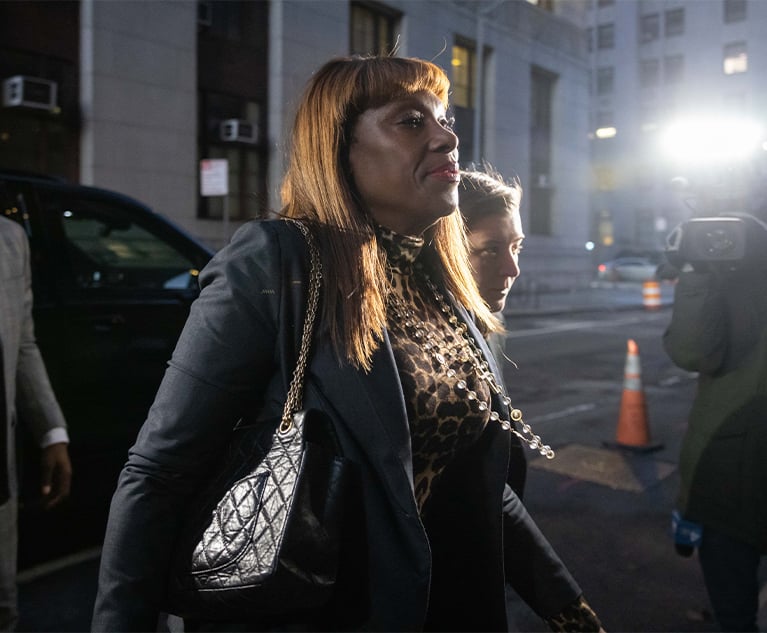 Judge Irizarry
Judge IrizarryBaklava Chefs' Jobs Not 'Creative' Under FLSA, Judge Rules
Baklava and baked goods chefs suing for overtime pay don't fall under the Fair Labor Standards Act's creative professional exemption, a federal judge in Brooklyn has ruled.
October 03, 2017 at 06:50 PM
4 minute read
Turkish baklava and baked goods chefs suing for overtime pay do not fall under the Fair Labor Standards Act's creative professional exemption because their tasks require “consistency and precision, not innovation and imagination,” a Brooklyn federal judge has ruled.
The exemption defense put forward by Gulluoglu, an entity that sells Turkish food from multiple storefronts, including in Brighton Beach, Brooklyn and Astoria, Queens, must fail because “although defendants adequately demonstrate that plaintiffs were experienced and talented [chefs], defendants do not demonstrate how plaintiffs' experience and talent were applied to an innovative and imaginative task,” wrote Chief Judge Dora Irizarry, sitting in the Eastern District of New York, in a decision that denied summary judgment to the defendants.
Irizarry's opinion adopted the May 10 report and recommendation of U.S. Magistrate Judge Ramon Reyes of the Eastern District of New York. Reyes' report had concluded both that genuine issues of material fact existed, so as to prevent summary judgment, and that defendants did not carry their burden in asserting the creative professional exemption, an affirmative defense.
Gulluoglu and co-defendant Ercan Karabeyoglu, a manager and part-owner of Gulluoglu, objected to much of Reyes' report and recommendation, meaning that Irizarry was required to give the objected-to portions a de novo—or “clear error”—review.
She found Reyes' report and recommendation to be “thorough and well-reasoned.”
“Exemptions for the FLSA are to be narrowly construed and the defendant bears the burden of proving that its employees fall within the exemption,” Irizarry wrote in a Sept. 30 opinion, adding, “Defendants did not sell their baklava and other baked goods in five-star or gourmet establishments, and plaintiffs, tasked with preparing baklava and other enumerated Turkish baked goods to be sold by third parties, did not have the autonomy to design unique dishes and menu items.”
Plaintiffs Suleyman Eren and Tuncay Sinan, both former baked goods chefs for Gulluoglu, sued the Turkish food seller and wholesaler in 2015, claiming that they had worked overtime for years but had not been compensated properly for the extra work under the FLSA and related New York Labor Law provisions. They asked for declaratory relief, unpaid overtime, spread-of-hours compensation under the NYLL and liquidated damages, among other relief.
Eren alleged, for example, that he worked as a baklava baker for defendants from 2005 to 2014, often working 60 hours weeks and starting at 5 a.m., but only getting paid a fixed weekly salary of $700 regardless.
Reyes, in his report and recommendation, noted Eren's skill and training, writing that before coming to the United States he had served as an apprentice to a baklava maker in Turkey for seven years.
But Reyes also pointed out that deposition testimony showed that Eren never prepared baklava from scratch for Gulluoglu, but rather would heat and apply a “sweet syrup” to frozen baklava imported from Turkey. And beginning in 2010, the baklava was imported pre-cooked, with the syrup glaze already applied, Reyes said.
Sinan also did not make the cakes he prepared from scratch, Reyes added, but instead defrosted imported ones and added cream and ornaments.
“Courts have been reluctant to apply this definition [for the exemption] to all but the most extraordinary chefs,” Reyes also wrote in explaining his denial of summary judgment.
Irizarry agreed.
Defendants argue that “plaintiffs' talent alone should trigger the exemption,” she wrote. “The regulatory language makes clear that an employee talented at an unimaginative and unoriginal task does not fall within the exemption.”
Irizarry also noted, “Defendants have pointed to no case, and this court cannot locate one, in which a court applied the creative professional exemption to a chef or a baker.”
Louis Pechman, of the Pechman Law Group, represented the plaintiffs. He said on Tuesday, “We thought that defendants were nuts to argue that a baklava maker was a 'creative professional' and thankfully Judge Irizzary agreed. Our clients were entitled to overtime pay and we look forward to establishing their damages at trial.”
Richard Soto, a lawyer with Advocates For Justice, represented the defendants. He could not be reached for comment.
This content has been archived. It is available through our partners, LexisNexis® and Bloomberg Law.
To view this content, please continue to their sites.
Not a Lexis Subscriber?
Subscribe Now
Not a Bloomberg Law Subscriber?
Subscribe Now
NOT FOR REPRINT
© 2024 ALM Global, LLC, All Rights Reserved. Request academic re-use from www.copyright.com. All other uses, submit a request to [email protected]. For more information visit Asset & Logo Licensing.
You Might Like
View All
Attorneys 'On the Move': Structured Finance Attorney Joins Hunton Andrews Kurth; Foley Adds IP Partner
4 minute read

NY Civil Liberties Legal Director Stepping Down After Lengthy Tenure

Former Top Aide to NYC Mayor Is Charged With Bribery Conspiracy
Trending Stories
- 1Call for Nominations: Elite Trial Lawyers 2025
- 2Senate Judiciary Dems Release Report on Supreme Court Ethics
- 3Senate Confirms Last 2 of Biden's California Judicial Nominees
- 4Morrison & Foerster Doles Out Year-End and Special Bonuses, Raises Base Compensation for Associates
- 5Tom Girardi to Surrender to Federal Authorities on Jan. 7
Who Got The Work
Michael G. Bongiorno, Andrew Scott Dulberg and Elizabeth E. Driscoll from Wilmer Cutler Pickering Hale and Dorr have stepped in to represent Symbotic Inc., an A.I.-enabled technology platform that focuses on increasing supply chain efficiency, and other defendants in a pending shareholder derivative lawsuit. The case, filed Oct. 2 in Massachusetts District Court by the Brown Law Firm on behalf of Stephen Austen, accuses certain officers and directors of misleading investors in regard to Symbotic's potential for margin growth by failing to disclose that the company was not equipped to timely deploy its systems or manage expenses through project delays. The case, assigned to U.S. District Judge Nathaniel M. Gorton, is 1:24-cv-12522, Austen v. Cohen et al.
Who Got The Work
Edmund Polubinski and Marie Killmond of Davis Polk & Wardwell have entered appearances for data platform software development company MongoDB and other defendants in a pending shareholder derivative lawsuit. The action, filed Oct. 7 in New York Southern District Court by the Brown Law Firm, accuses the company's directors and/or officers of falsely expressing confidence in the company’s restructuring of its sales incentive plan and downplaying the severity of decreases in its upfront commitments. The case is 1:24-cv-07594, Roy v. Ittycheria et al.
Who Got The Work
Amy O. Bruchs and Kurt F. Ellison of Michael Best & Friedrich have entered appearances for Epic Systems Corp. in a pending employment discrimination lawsuit. The suit was filed Sept. 7 in Wisconsin Western District Court by Levine Eisberner LLC and Siri & Glimstad on behalf of a project manager who claims that he was wrongfully terminated after applying for a religious exemption to the defendant's COVID-19 vaccine mandate. The case, assigned to U.S. Magistrate Judge Anita Marie Boor, is 3:24-cv-00630, Secker, Nathan v. Epic Systems Corporation.
Who Got The Work
David X. Sullivan, Thomas J. Finn and Gregory A. Hall from McCarter & English have entered appearances for Sunrun Installation Services in a pending civil rights lawsuit. The complaint was filed Sept. 4 in Connecticut District Court by attorney Robert M. Berke on behalf of former employee George Edward Steins, who was arrested and charged with employing an unregistered home improvement salesperson. The complaint alleges that had Sunrun informed the Connecticut Department of Consumer Protection that the plaintiff's employment had ended in 2017 and that he no longer held Sunrun's home improvement contractor license, he would not have been hit with charges, which were dismissed in May 2024. The case, assigned to U.S. District Judge Jeffrey A. Meyer, is 3:24-cv-01423, Steins v. Sunrun, Inc. et al.
Who Got The Work
Greenberg Traurig shareholder Joshua L. Raskin has entered an appearance for boohoo.com UK Ltd. in a pending patent infringement lawsuit. The suit, filed Sept. 3 in Texas Eastern District Court by Rozier Hardt McDonough on behalf of Alto Dynamics, asserts five patents related to an online shopping platform. The case, assigned to U.S. District Judge Rodney Gilstrap, is 2:24-cv-00719, Alto Dynamics, LLC v. boohoo.com UK Limited.
Featured Firms
Law Offices of Gary Martin Hays & Associates, P.C.
(470) 294-1674
Law Offices of Mark E. Salomone
(857) 444-6468
Smith & Hassler
(713) 739-1250






